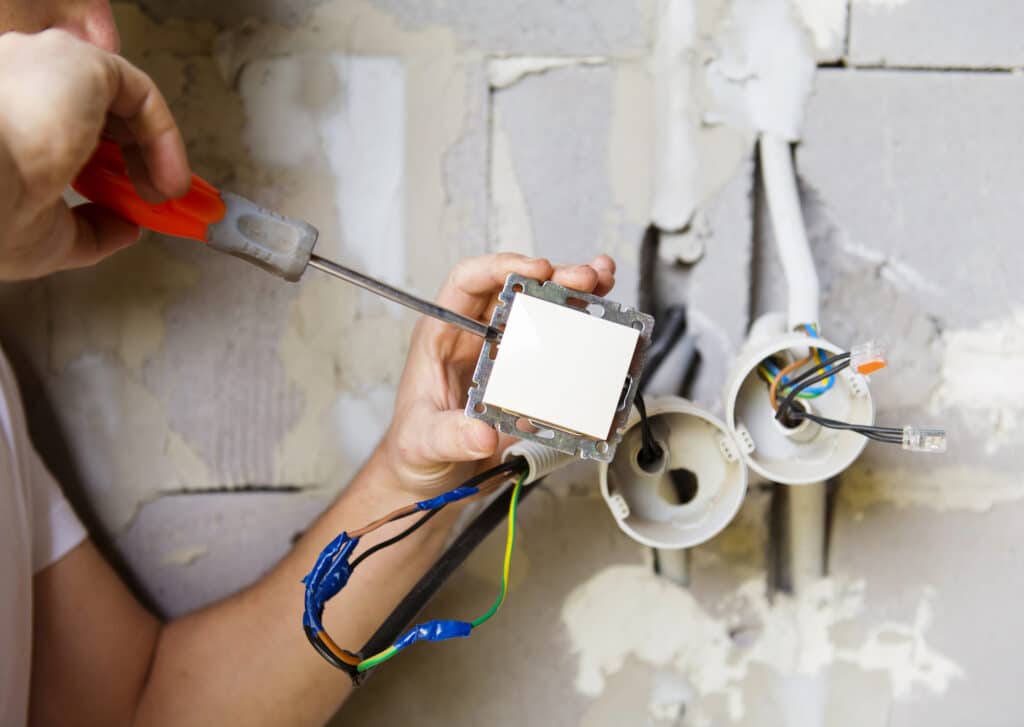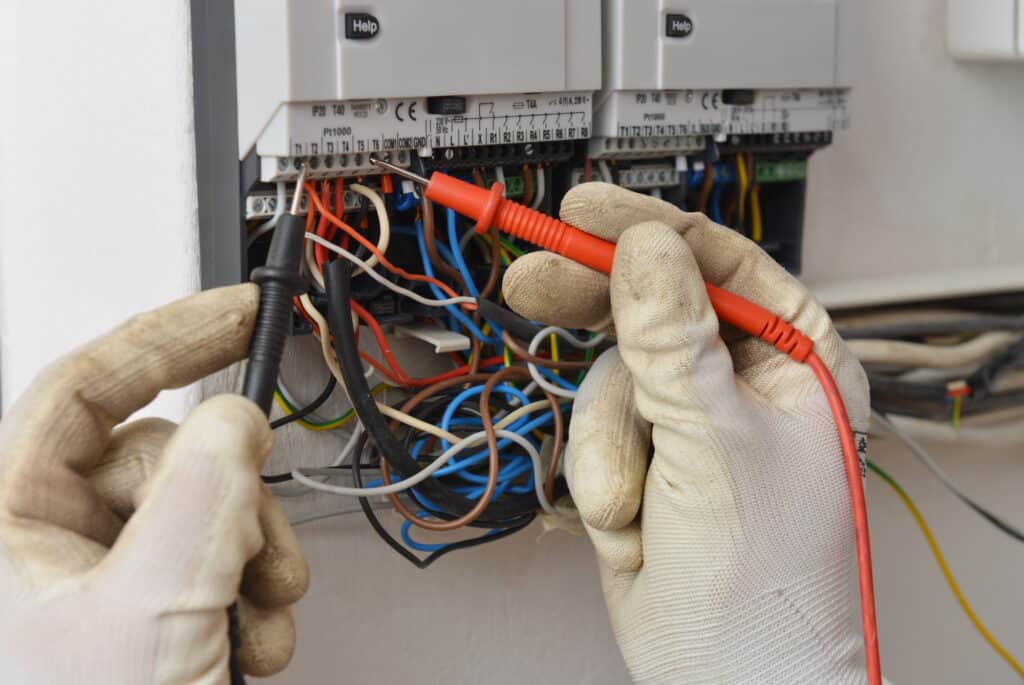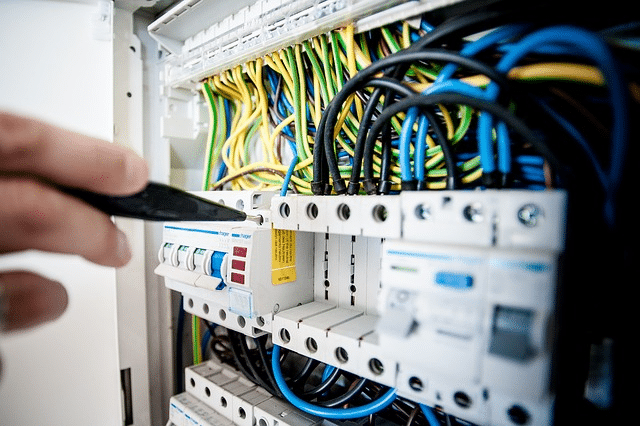Whole House Rewiring Services
Rewiring a whole house is a significant project that involves replacing all the electrical wires in your home. It’s often necessary in older homes where the existing wiring may not be safe or capable of handling modern electrical demands. Here’s what you need to know about this process.
Why Rewire the Whole House?
The main reasons to rewire a house include improving safety, increasing electrical capacity, and updating old systems like the knob and tube wiring and aluminum wiring. Old wiring can pose a fire risk and old wires may not be able to handle the load of modern appliances. If your home frequently experiences blown fuses, flickering lights, or other electrical issues, it might be time for a rewire.


The Home Rewiring Process
Whole house rewiring involves removing and replacing all the electrical wires in your home. This includes the wires running from the electrical panel to each outlet, switch, and light fixture. It’s a complex task that requires careful planning and should only be done by a licensed electrician.
Time Frame
The time it takes to rewire a house depends on other factors than its size and complexity, but it typically ranges from a few days to a few weeks. During this time, parts of your home may be without power.
Cost to rewire
The total cost of rewiring a house varies based on factors like the size of the house, the type of wiring used, and local labor rates. However, it’s a significant investment that can range from a few thousand dollars to over ten thousand.
Living Arrangements
Depending on the scope of labor cost of the project, you may need to make alternative living arrangements while the work is being done. Some people choose to stay with family or friends, while others rent a temporary place.
Permits and Inspections
Most areas require permits for major electrical work, including whole house rewiring. After the work is completed, an inspection will likely be required to ensure the new wiring meets local building codes.
Benefits
While it’s a big project, whole house rewiring has several benefits. It can make your home safer, allow for more electrical devices, and increase your home’s value.
Whole house rewiring is a major task that should be undertaken with careful consideration. It’s essential to hire a professional electrician to ensure the job is done safely and correctly. Despite the cost and inconvenience, the safety and functionality benefits make it a worthwhile investment for many homeowners.

FAQs
How much does it cost to rewire a full house?
The cost to rewire a full house can vary greatly. It depends on several factors such as the size of the house, the age of the existing wiring, and where you live. On average, though, you might expect to pay between $1,500 to $10,000.
For a smaller home, the cost could be at the lower end of this range. For larger homes or those with complex wiring needs, the cost could be at the higher end. If the house is very old and the existing wiring is in poor condition, it might also cost more to just rewire a house.
Get a Quote from us! This will help you understand the costs better and choose the best option for your budget. Remember, while rewiring a house can be expensive, it’s a crucial step in ensuring the safety of your home.
Is it possible to rewire entire house?
Yes, it is possible to rewire an entire house. However, this task can be complex and time-consuming. It involves replacing old, unsafe, or outdated electrical wiring with new, safer, and more efficient electrical wiring systems.
Here are the steps typically involved in a rewiring project of a house:
Planning:
This step involves assessing the current wiring system, identifying the changes needed, and creating a detailed plan for the new wiring layout.
Removing Old Wiring:
The old wiring is carefully removed from the walls, ceilings, and floors. This process must be done with care to avoid damage to the structure of the house.
Installing New Wiring:
This includes running wires through the walls, ceilings, and floors, and connecting them to outlets, switches, and fixtures.
Testing:
After the new wiring is installed, it’s tested to ensure it’s safe and working properly.
Finishing:
Once the testing is complete, the walls, ceilings, and floors are repaired and finished.
How much does it cost to wire a 2000 square foot house?
The cost to wire a 2000 square foot house can vary greatly depending on several factors. These include the location of faulty wiring in the house, the complexity of the wiring job, and the rates charged by the electrician.
On average, the cost for wiring a new house is typically between $2 to $4 per square foot. So, for a 2000 square foot house, this would mean an estimated cost of $4000 to $8000.
However, it’s important to remember that these are just averages. The actual cost could be higher or lower. For example, if the house has multiple stories or complex architectural features, the cost could be higher. Similarly, if the house is located in an area where labor costs are low, the cost could be lower.
This will give you a better idea of what the job will likely cost and help you budget accordingly.
Can a house be rewired without removing drywall?
Yes, home rewiring without removing drywall. This process is known as “fishing” electrical wires through the walls. It involves creating small access holes where the new wiring will enter and exit. The new wires are then guided or “fished” through these holes using special tools. However, this task requires skill and knowledge about electrical systems. It’s recommended to hire a professional electrician to ensure safety and proper installation.
Is it worth rewiring a house?
Rewiring a house can be a big task, but it’s often worth it. Here are some reasons why:
-
- Safety: Old wiring can be a fire hazard. If your house is more than 40 years old and hasn’t been rewired, it might be time to consider it.
-
- Modern Needs: Today’s electronics and appliances need more power than older systems can provide. Rewiring can help meet these needs.
-
- Resale Value: A house with updated wiring can be more attractive to buyers. It shows that the house has been well-maintained.
However, rewiring a whole house, can also be costly and disruptive. You’ll need to weigh the benefits against the potential drawbacks. Consulting with our professional electrician can help you make an informed decision.
Can you completely rewire an old house?
Absolutely, you can completely rewire an old house. However, it’s a big job that requires careful planning and execution. Here are the steps involved:
Inspection:
First, have a professional electrician inspect the current wiring and electrical system. They will identify any issues and suggest necessary upgrades.
Planning:
Next, plan out the new electrical system. This includes deciding where outlets and switches will go, what kind of lighting you want, and how many circuits you need.
Removal:
Then, the old wiring is removed. This can be a messy process, as it often involves cutting into walls and ceilings.
Installation:
After that, the new electrical wiring and panel is installed. This involves running wires through the walls and connecting them to outlets, switches, and circuit breakers.
Testing:
Once everything is installed, the system is tested to make sure everything works properly.
Patching and Painting:
Finally, any holes made during the process are patched up and painted over.
Remember, rewiring a house is a complex task that should be done by a licensed electrician. It’s not a DIY project for most people. Always prioritize safety when dealing with electricity.
